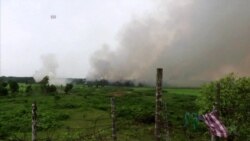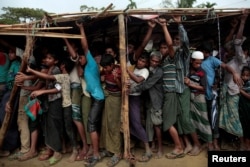Myanmar and neighboring Bangladesh have completed an agreement to repatriate scores of Rohingya Muslims who fled Myanmar to escape a brutal military crackdown.
Bangladesh issued a statement Tuesday saying the repatriations will begin next week, with the goal of completing the process within the next two years.
WATCH: Rohingya Refugees Want Safety Guarantees Before Returning to Myanmar
Dhaka says the repatriation process will give priority to "family units" and orphans and "children born out of unwarranted incidence" — a reference to children conceived by rape. The agreement calls for Bangladesh to set up five transit camps that will move the refugees into two reception areas in Myanmar's Rakhine state.
But international watchdog Amnesty International called the deal "premature", saying that Rohingya, who allegedly were not consulted for the deal, have no gaurantee of safety upon their return.
"The obfuscation and denials of the Myanmar authorities give no reason to hope that the rights of returning Rohingya would be protected, or that the reasons for their original flight no longer exist," James Gomez, Amnesty International’s Regional Director for Southeast Asia and the Pacific, said in a statement Tuesday. “The Rohingya have an absolute right to return to and reside in Myanmar, but there must be no rush to return people to a system of apartheid. Any forcible returns would be a violation of international law."
About 650,000 Rohingyas have fled into Bangladesh since last August, when Myanmar forces launched a scorched earth campaign against Rohingya villages in Rakhine state in response to attacks on Myanmar police outposts by Rohingya militants.
The refugees, living in overcrowded camps in Bangladesh's Cox's Bazar district, have told human rights organizations of numerous atrocities committed by security forces, including the burning down of homes and entire villages, random shootings and rapes.
The United Nations has described the reported actions carried out by Myanmar forces as "a textbook case of ethnic cleansing." Myanmar dismisses the stories as exaggerated, and the army has cleared itself of any abuses.
Humanitarian groups say the children living in the overcrowded camps are suffering a host of illnesses, including anemia, diarrhea, diphtheria and cholera, due to malnutrition and poor sanitary conditions.
The Rohingya minority has been denied citizenship and other rights in Buddhist-majority Myanmar.
Myanmar views the Rohingya as immigrants from Bangladesh, despite the fact that many families have lived in Myanmar for generations.








